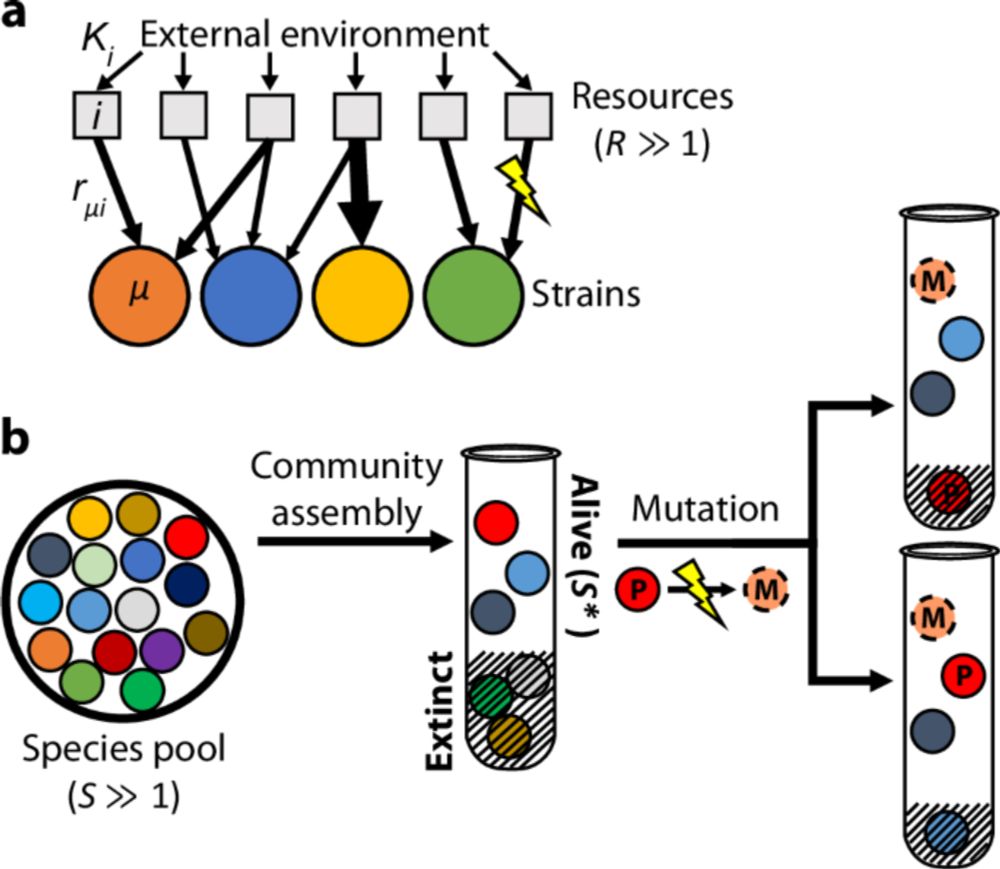Researcher at INRAE, France
http://mariesimonin.com/
We show how transient microbes can play key roles in plant fitness & microbiota assembly 🦠
The 1st 1st author article for my 2 fantastic PhD students @logansuteau.bsky.social & Louna Coleart-Sentenac 🎉
www.sciencedirect.com/science/arti...




Détails ici:
emploi.cnrs.fr/Offres/CDD/U...
Début 01/01/2026 pour 18 mois potentiellement renouvelable.
candidature jusqu'au 29/11
N’hésitez pas à diffuser largement
Détails ici:
emploi.cnrs.fr/Offres/CDD/U...
Début 01/01/2026 pour 18 mois potentiellement renouvelable.
candidature jusqu'au 29/11
N’hésitez pas à diffuser largement
nph.onlinelibrary.wiley.com/doi/10.1111/...

nph.onlinelibrary.wiley.com/doi/10.1111/...
nph.onlinelibrary.wiley.com/doi/10.1002/...

nph.onlinelibrary.wiley.com/doi/10.1002/...
www.science.org/doi/10.1126/...
www.science.org/doi/10.1126/...

www.science.org/doi/10.1126/...
www.science.org/doi/10.1126/...
buff.ly/0sNZeWs
A 5-year long experiment, super impressive! I wonder whether the offspring of the final generation would have retained the performance difference, esp. after controlling for seed size/maternal investment.

buff.ly/0sNZeWs
A 5-year long experiment, super impressive! I wonder whether the offspring of the final generation would have retained the performance difference, esp. after controlling for seed size/maternal investment.
www.biorxiv.org/content/10.1...
www.biorxiv.org/content/10.1...

@cp-trendsmicrobiol.bsky.social Spotlight by Kotaro Kiga and Rodrigo Ibarra-Chávez
www.cell.com/trends/micro...

@cp-trendsmicrobiol.bsky.social Spotlight by Kotaro Kiga and Rodrigo Ibarra-Chávez
www.cell.com/trends/micro...
Cool @natmicrobiol.nature.com publication by @erikbakkeren.bsky.social
@vit-pi.bsky.social @meganleeny.bsky.social @microscape.bsky.social & Kevin Foster
www.nature.com/articles/s41...

Cool @natmicrobiol.nature.com publication by @erikbakkeren.bsky.social
@vit-pi.bsky.social @meganleeny.bsky.social @microscape.bsky.social & Kevin Foster
www.nature.com/articles/s41...
Results on multi-kingdom SynCom experiments inoculated on seeds to perform plant microbiome engineering & promote pathogen resistance on rapeseed & common bean 🫘 🌱
@emersys-irhs.bsky.social


Results on multi-kingdom SynCom experiments inoculated on seeds to perform plant microbiome engineering & promote pathogen resistance on rapeseed & common bean 🫘 🌱
@emersys-irhs.bsky.social
Some results from the SUCSEED project on culturomics and SynComs 🫘🧫🌱 #PMS2025
@emersys-irhs.bsky.social

Some results from the SUCSEED project on culturomics and SynComs 🫘🧫🌱 #PMS2025
@emersys-irhs.bsky.social
We will present results from the SUCSEED project on culturomics and seed microbiome engineering using multi-kingdom SynComs 🫘🧫
@emersys-irhs.bsky.social


We will present results from the SUCSEED project on culturomics and seed microbiome engineering using multi-kingdom SynComs 🫘🧫
@emersys-irhs.bsky.social
Looking forward to seeing you in Antequera (Malaga) on 3-7 November!
Final program at: 6thplantmicrobiomesymposium2025.com/programme/
#Plantscience #MicrobiomeResearch #Bioinformatics

Looking forward to seeing you in Antequera (Malaga) on 3-7 November!
Final program at: 6thplantmicrobiomesymposium2025.com/programme/
#Plantscience #MicrobiomeResearch #Bioinformatics
Our new paper presents pangenome-informed amplicons that provide up to 10× higher phylogenetic resolution than full-length ribosomal markers- while remaining cost effective and scalable!
microbiomejournal.biomedcentral.com/articles/10....

Our new paper presents pangenome-informed amplicons that provide up to 10× higher phylogenetic resolution than full-length ribosomal markers- while remaining cost effective and scalable!
microbiomejournal.biomedcentral.com/articles/10....
Ricks et al.
nph.onlinelibrary.wiley.com/doi/10.1111/...

Ricks et al.
nph.onlinelibrary.wiley.com/doi/10.1111/...
To simplify things, I've attached a visual abstract.
Comments on the preprint are welcome!
#microsky #microbesky
www.biorxiv.org/content/10.1...

To simplify things, I've attached a visual abstract.
Comments on the preprint are welcome!
#microsky #microbesky
www.biorxiv.org/content/10.1...

📖 doi.org/10.1111/nph....
#mycorrhiza #PlantScience

📖 doi.org/10.1111/nph....
#mycorrhiza #PlantScience
More details below. The position will start next year.
Please circulate and repost.
jobs.smartrecruiters.com/WesternSydne...

More details below. The position will start next year.
Please circulate and repost.
jobs.smartrecruiters.com/WesternSydne...
Paper here: www.science.org/doi/10.1126/...
Perspective here: www.science.org/doi/10.1126/...
Paper here: www.science.org/doi/10.1126/...
Perspective here: www.science.org/doi/10.1126/...
I enjoyed chatting about our research on seed microbiota, holobionts and alternatives to pesticides 🦠👩💻🌱
@emersys-irhs.bsky.social @irhs-angers.bsky.social


I enjoyed chatting about our research on seed microbiota, holobionts and alternatives to pesticides 🦠👩💻🌱
@emersys-irhs.bsky.social @irhs-angers.bsky.social
Nutritional endosymbionts are prevalent with a new 7,783 bacterial genomes from 1,373 bacterial species. @holobiontbiology.bsky.social
www.nature.com/articles/s41...

Nutritional endosymbionts are prevalent with a new 7,783 bacterial genomes from 1,373 bacterial species. @holobiontbiology.bsky.social
www.nature.com/articles/s41...


